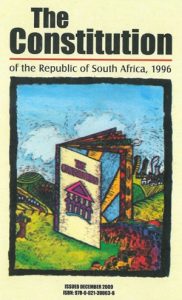Constitutional Mandate

The national and provincial spheres of government have concurrent legislative competence in accordance with Schedule 4 of the RSA Constitution (Act 108 of 1996). Hence, Parliament and the Provincial Legislatures of the Republic of South Africa at national and provincial level have the power to make laws for the country in accordance with Section 43(a) and Section 44 of the Constitution. The National Council of Provinces (NCOP) represents the provinces to ensure that provincial interests are taken into account in the national legislative process. This is done by participating in the national legislative process and by providing a national forum for the public consideration of issues affecting the provinces.
Section 43 of the Constitution provides that legislative authority of the national, provincial and local sphere of government is vested in:
- Parliament – i.e. the National Assembly (NA) and the National Council of Provinces (NCOP)
- The nine Provincial Legislatures
- The municipal councils.
In terms of Section 44(1)(a), the National Assembly has the power to:
- Amend the Constitution
- Pass legislation with regard to any matter within the functional areas of concurrent national and provincial legislative competence (Schedule 4 of the Constitution), but excluding (subject to Subsection 2) matters falling within the functional areas of exclusive Provincial Legislative competence (Schedule 5 of the Constitution)
- Assign any of its legislative powers, except the power to amend the Constitution, to any legislative body in another sphere of government.
In terms of Section 44(1)(b), the national legislative authority vested in Parliament confers on the National Council of Provinces (NCOP) the power to:
- Participate in amending the Constitution in accordance with Section 74
- Pass ordinary Bills affecting the provinces (Section 76 of Constitution)
- Consider ordinary Bills not affecting the provinces (Section 75 of the Constitution) but passed by the National Assembly.
Parliament may intervene and pass legislation that falls within the functional areas of exclusive provincial legislative competence, only when it is necessary to:
- Maintain national security
- Maintain economic unity
- Maintain essential national standards
- Establish minimum standards required for the rendering of services
- Prevent unreasonable action taken by a province, which is prejudicial to the interests of another province or to the country as a whole.
THE NATIONAL COUNCIL OF PROVINCES (NCOP)
The National Council of Provinces (NCOP) represents the provinces by ensuring that provincial interests are taken into account in the national sphere of government. It consists of nine delegations of ten members from each of the provincial legislatures, six of whom are permanent members (for a five-year period) based at Parliament. Four are special delegates who are based in the provincial legislatures, and who travel to Parliament when necessary. Each delegation is headed by the premier of a province or a person designated by the premier.
In accordance with Section 42(4), the NCOP represents the provinces to ensure that provincial interests are taken into account in the national legislative process. It does this mainly by participating in the national legislative process and by providing a national forum for the public consideration of issues affecting the provinces. Local government can, through organised formations, participate in proceedings of the NCOP although local government may not vote.
The national and provincial spheres of government have concurrent legislative competence in accordance with Schedule 4 of the Constitution. In terms of Section 155(6)(a), the nine Provincial Legislatures have an obligation to monitor and support the local government in their respective provinces. Furthermore, in terms of Section 155(7), the legislatures have legislative and executive authority to see to the effective performance of municipalities in respect of those competencies. However, the national government’s authority is subject to Section (44)(2).
